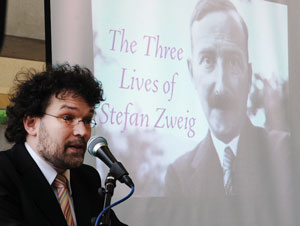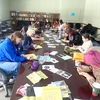
|
Scholars from the United States and throughout the world assembled in early October at SUNY Fredonia, home of one of the world’s most significant collections of Stefan Zweig materials, for a three-day symposium devoted to the life and works of the prominent early 20th century Austrian-Jewish author.
“We felt the Zweig Symposium was an unqualified success,” said symposium co-chair Jeremy Linden, head of Archives and Special Collections at Daniel Reed Library. “The first gathering of Zweig scholars in North America in more than 25 years, the support and participation of our own students, faculty and community, and the positive response of our visitors to our campus and community made for an exciting and enlightening experience.”
Those three days proved to be an enriching experience for students by clearly demonstrating how scholars gather to examine an author and his/her works. “I learned much that weekend not only about Zweig himself but also literature and the way it is studied at the doctoral level,” said Andy McGirr, a first-year graduate student in English from Tonawanda, N.Y.
Highlights included keynote addresses by Dr. Klaus Weissenberger of Rice University, and Zweig biographer Oliver Matuschek, author of, The Three Lives of Stefan Zweig.
The symposium featured an exhibition of numerous archival materials from the university’s internationally known Zweig collection, many of which were on public display for the very first time. Symposium presentations addressed the following themes: Transatlantic Zweig; Zweig’s Connections; Zweig and Brazil; and Zweig and Politics.
The U.S. premiere of the Brazilian feature film, “Lost Zweig,” (2002) was held at the 1891 Fredonia Opera House. Filmmaker Sylvio Back, its director, attended the screening and answered questions from the audience.
The symposium followed the opening of, “The Life, Works & World of Stefan Zweig,” a semester-long exhibit at Reed Library that presented an overview of Zweig’s life and works and the significance he held during the European Modernism period of the 1920s and 1930s.
Zweig’s prolific literary career and extraordinary life offer unique insight into the artistic and political turbulence of the first half of the 20th century, explained Dr. Birger Vanwesenbeeck, symposium co-chair and SUNY Fredonia assistant professor of English. “As a self-styled humanist and pacifist as well as a longtime advocate for European unification, Zweig was deeply affected by the carnage of World War I and subsequently sought to redeem its trauma through artistic-cultural solidarity,” Vanwesenbeeck said.
Born in 1881, Zweig — like many other Austrian and European Jews — was forced into exile during Hitler’s rise to power in Germany. Zweig, whose books were burned by the Nazis, fled Vienna in 1934, moving first to England, then to the U.S. and, in 1941, to Brazil. Shortly after moving to Brazil, and distraught by another war that was ravaging his European homeland and its culture, Zweig took his own life through a suicide pact with his second wife, Lotte, in 1942.
SUNY Fredonia’s connection to Zweig was made through the late Dr. Robert Rie, a professor of modern languages from 1963 to 1981 and a longtime colleague of Zweig.
Rie’s enduring friendship with Zweig began while both were living in Austria. Following Zweig’s death, Rie remained in regular contact with the author’s first wife, Friderike, who ultimately entrusted him and SUNY Fredonia with many of Zweig’s personal effects. The materials on display from the collection include personal items, such as his signature seal, naturalization papers and family photographs, as well as manuscript drafts of plays, essays, poetry and short stories.
His stature in the literary world is revealed in hand-written and typed letters between Zweig and William Butler Yeats, Joseph Roth, James Joyce, Virginia Woolf and other prominent early 20th century European artists, also on display.
Personal correspondence is viewed as the collection’s most valuable component, said SUNY Fredonia reference librarian Gerda Morrissey, who also serves as associate curator of the collection. More than 8,000 pieces of correspondence, manuscripts and personal and family items comprise the full collection, which is Fredonia’s largest and most significant.
SUNY Fredonia President Dennis Hefner, along with College of Arts and Humanities Dean John Kijinski, offered welcoming remarks at a reception held at Reed Library’s Japanese Garden.



